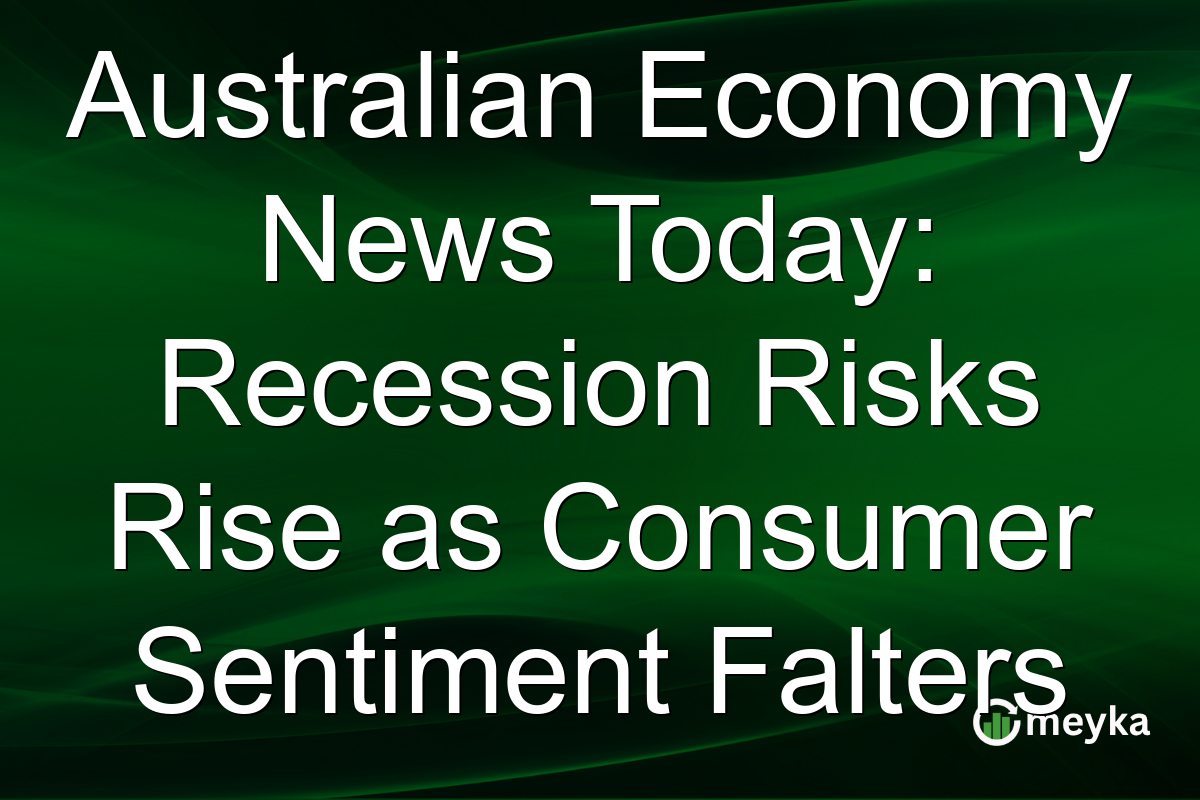Australian Economy News Today: Recession Risks Rise as Consumer Sentiment Falters
As we delve into the latest developments, we find the Australian economy facing mounting recession risks. Consumer sentiment has taken a significant hit, affecting spending and economic growth prospects. Recent reports suggest a sharp decline in consumer confidence, raising concerns about the Reserve Bank of Australia’s potential policy shifts. Stay with us as we explore these economic pressures and their implications.
Consumer Confidence Takes a Hit
Consumer confidence in Australia has plummeted to levels not seen since the early 2020s. According to the latest data, sentiment decreased by 7.3% in September, raising alarms about economic stability. This drop directly impacts retail and household spending, two crucial components of Australia’s economic engine. The recent report highlights that this sentiment decline is affecting market dynamics, with a pronounced slowdown in retail sales. This downturn contributes to the looming fears of an Australian economy recession. With household spending accounting for over 55% of GDP, these numbers cannot be ignored. As consumers tighten their belts, businesses also face the ripple effects of decreased expenditure. Analysts are closely monitoring these shifts, given the direct correlation between consumer confidence and broader economic health. Bridging this confidence gap is vital in mitigating the country’s recession risks.
Interest Rate Policies in the Spotlight
The Reserve Bank of Australia (RBA) is under scrutiny as decisions on interest rates become critical. Currently, the RBA’s cash rate remains at 1.5%, unchanged for several months. However, the question arises: should the Bank cut rates to counteract declining consumer confidence? Bloomberg reports indicate that the pressure to decrease rates is mounting as economic growth slows. Lower interest rates could potentially stimulate spending by reducing borrowing costs, but this move carries its risks. The Australian dollar, represented by AUDUSD, might depreciate, affecting the import/export balance. While an interest rate cut could offer short-term relief, it might lead to long-term inflationary pressures. The RBA’s decision-making process involves weighing these complex factors as they navigate efforts to safeguard economic growth.
Economic Growth Outlook: Challenges Ahead
The outlook for Australia’s economic growth is currently bleak, as forecasts are downgraded. Economic growth has fallen to an annual rate of 1.8%, down from previous projections of 2.3%. This decline emphasizes the immediate challenges the country faces. Analyzing these challenges, we see that external factors like weaker global trade and domestic issues contribute to this downturn. Even the real estate sector, a fundamental pillar of Australian wealth, is softening. Acknowledging these combined pressures, economic experts are calling for strategic policy revisions and fiscal measures. According to analysis from CNBC, possible solutions could involve increased public spending on infrastructure to stimulate growth. Such measures could counterbalance the negative effects of slowed household consumption, stabilizing the economic growth outlook.
Potential Impact on Global Investment
The repercussions of Australia’s economic situation are not isolated. Global investors keenly watch these developments, as a potential recession could ripple through international markets. For currency investors, the Australian dollar’s performance is an area of concern. As interest rate cuts loom, AUDUSD could experience increased volatility. This uncertainty affects not only direct currency investments but also broader market confidence. Shifts in Australia’s economic landscape also impact its trading partners. China, a significant trade ally, might face indirect consequences from slowed Australian demand. Investors should consider these dynamics when assessing global investment strategies, accommodating these risks into their financial plans.
Final Thoughts
The ongoing decline in consumer confidence highlights critical pressures on the Australian economy. As recession fears mount, the focus shifts to strategic policy decisions by the Reserve Bank of Australia and the broader impact on global markets. Investors must stay informed, utilizing resources such as Meyka to analyze real-time data and trends. This proactive approach is essential for navigating these uncertain waters in the days ahead.
FAQs
The drop in consumer confidence, slowing retail sales, and external economic pressures contribute to recession risks in Australia. These factors combine to weaken overall economic growth.
The RBA is considering interest rate cuts as part of their response. However, they must balance stimulating the economy with potential inflation risks.
Australia’s economic health affects global markets, especially through currency fluctuations and trade relations with partners like China. These changes influence global investment strategies.
Disclaimer:
This is for information only, not financial advice. Always do your research.






